- Home
- Hermann Hesse
Siddhartha Page 3
Siddhartha Read online
Page 3
And in the last hour of night before day began, he got up once more, went into the room, and saw the youth standing there; he looked tall to him and like a stranger.
"Siddhartha," he said, "why do you wait here?"
"You know why."
"Will you remain standing here, waiting, until day comes, noon comes, evening comes?"
"I will remain standing here, waiting."
"You will grow tired, Siddhartha."
"I will grow tired."
"You will fall asleep, Siddhartha."
"I will not fall asleep."
"You will die, Siddhartha."
"I will die."
"And you would rather die than obey your father?"
"Siddhartha has always obeyed his father."
"So you will give up your plan?"
"Siddhartha will do as his father instructs him."
The first light of day fell into the room. The Brahmin saw that Siddhartha's knees were trembling quietly. In Siddhartha's face he saw no trembling; his eyes gazed into the distance straight before him. The father realized then that Siddhartha was no longer with him in the place of his birth. His son had already left him behind.
The father touched Siddhartha's shoulder.
"You will go," he said. "Go to the forest and be a Samana. If you find bliss in the forest, come and teach it to me. If you find disappointment, return to me and we will once more sacrifice to the gods side by side. Now go and kiss your mother; tell her where you are going. It is time for me to go to the river and begin my first ablutions."
He took his hand from his son's shoulder and went out. Siddhartha lurched to one side when he tried to walk. Forcing his limbs into submission, he bowed before his father and went to find his mother to do as his father had instructed.
In the first light of dawn, as he was slowly leaving the town on his stiff legs, a shadow rose up beside the last hut, a shadow that had been crouching there and now joined the pilgrim: Govinda.
"You came," said Siddhartha, and smiled.
"I came," Govinda said.
AMONG THE SAMANAS
In the evening of this day they caught up with the ascetics, the gaunt Samanas, and offered to accompany them, promising obedience. They were accepted.
Siddhartha gave his robe to a poor Brahmin on the road. He now wore only his loincloth and an earth-hued wrap that had been cut but not sewn. He ate only once a day, and only food that had not been cooked. He fasted for fifteen days. He fasted for twenty-eight days. The flesh vanished from his thighs and cheeks. Hot tears flickered in his enlarged eyes, the nails grew long on his withering fingers, and from his chin grew a dry, patchy beard. His gaze was like ice when he came upon women; his mouth twitched with contempt when he walked through a town full of elegantly clothed people. He observed merchants doing business, princes on their way to hunt, the bereaved mourning their dead, whores soliciting, doctors tending to patients, priests choosing the day when the seeds would be sown, lovers making love, mothers nursing their infants--and all these things were unworthy of being looked upon by him; it was all a lie, it all stank, stank of lies, it all gave the illusion of meaning and happiness and beauty, and all of it was just putrefaction that no one would admit to. Bitter was the taste of the world. Life was a torment.
Before him, Siddhartha saw a single goal: to become empty, empty of thirst, empty of want, empty of dream, empty of joy and sorrow. To let the ego perish, to be "I" no longer, to find peace with an empty heart and await the miraculous with thoughts free of Self. This was his goal. When all ego had been overcome, had perished, when every longing and every drive in his heart had fallen silent, only then could the Utmost awaken, the great secret, that innermost core of being that is no longer Self.
Silent, Siddhartha stood beneath the sun's vertical rays, glowing with pain, glowing with thirst--stood there until he no longer felt pain or thirst. Silent, he stood in monsoon season; water trickled from his hair onto freezing shoulders, over freezing hips and legs, but the penitent stood until shoulders and legs no longer froze, until they fell silent and were still. Silent, he crouched among thornbushes while blood dripped from his burning skin and pus dripped from open wounds; Siddhartha remained there unyielding, remained motionless until no more blood flowed, nothing pricked any longer, nothing burned.
Siddhartha sat upright and learned to conserve his breath, learned to get by with little air, learned to shut off his breathing. He learned, beginning with his breath, to slow the beating of his heart, learned to decrease his heartbeats until there were few of them, almost none at all.
Instructed by the eldest of the Samanas, Siddhartha practiced the eradication of ego, practiced samadhi according to new Samana rules. A heron flew over the bamboo forest--and Siddhartha received the heron into his soul, flew over forests and mountains, was heron, ate fish, felt the pangs of heron hunger, spoke in heron squawks, died a heron death. A dead jackal lay on the sandy bank--and Siddhartha's soul slipped into the corpse, was dead jackal, lay on the beach, grew bloated, stank, decayed, was torn apart by hyenas and flayed by vultures, became a skeleton, became dust, blew into the fields. And Siddhartha's soul returned--it had died, had decayed, become dust, it had tasted the bleak euphoria of the cyclical journey, and then, freshly thirsty, it waited, crouching like a hunter for the gap in the cycle where escape was possible, where the end of causality began, an eternity free of sorrow. He killed off his senses, he killed off his memory, he slipped from his Self to enter a thousand new shapes--was animal, was cadaver, was stone, was wood, was water--and each time he awakened he found himself once more. The sun would be shining, or else the moon, and he was once more a Self oscillating in the cycle; he felt thirst, overcame the thirst, felt new thirst.
Siddhartha learned many things from the Samanas; he learned to walk many paths leading away from the Self. He walked the path of eradication of ego through pain, through the voluntary suffering and overcoming of pain, of hunger, of thirst, of weariness. He walked the path of eradication of ego through meditation, using thought to empty the mind of all its notions. These and other paths he learned to walk. A thousand times he left his Self behind, spent hours and days at a time liberated from it. But just as all these paths led away from the Self, the end of each of them returned him to it. Even if Siddhartha fled the Self a thousand times, lingering in nothingness, in the animal, in stone, his return was unavoidable, the hour inescapable when he found himself once more, in sunlight or moonlight, in shade or rain, and once more he was Self, was Siddhartha, and once more he felt the torments of the cycle imposed on him.
Beside him lived Govinda, his shadow, walking the same paths, subjecting himself to the same exertions. Rarely did they speak of anything beyond what duty and their exercises required. Sometimes they walked together through the villages to beg food for themselves and their teachers.
"What say you, Govinda," Siddhartha inquired on one such excursion, "what say you: Are we now farther than we were? Have we reached goals?"
Govinda replied, "We have learned and we are learning. You will be a great Samana, Siddhartha. You have mastered each exercise swiftly and have often been admired by the elder Samanas. You will be a holy man one day, O Siddhartha."
Said Siddhartha, "This is not how matters appear to me, my friend. Everything I have learned to this day from the Samanas, O Govinda, I might have learned more quickly and simply. In some bar in a street full of whores, my friend, among the cart drivers and dice players, I might have learned these things."
Govinda said, "Siddhartha is joking with me. How could you have learned samadhi, the holding of the breath, the insensibility to hunger and pain among such miserable creatures?"
But Siddhartha spoke softly, as if speaking to himself. "What is meditation? What is leaving the body? What is fasting? What is holding the breath? It is all an escape from Self, it is a brief respite from the torment of being Self, a brief numbing of the pain and senselessness of life. This is the same escape, the same numbness the ox driver f
inds at the inn when he drinks a few bowls of rice wine or fermented coconut milk. Then he no longer feels his Self, he no longer feels the pain of life; he briefly finds numbness. Dozing off over his bowl of rice wine, he finds just the same thing that Siddhartha and Govinda find when they manage to flee their bodies with the help of lengthy exercises so as to linger in that-which-is-not-Self This is how it is, Govinda."
Govinda replied, "So you say, O friend, and yet you know that Siddhartha is no driver of oxen and a Samana is no drunkard. It is surely true that a drinker finds numbness, surely true that he briefly finds respite and escape, but then he returns from this delusion and finds all as it was. He has not grown wiser, has not gathered wisdom, has not ascended to a higher rung."
And Siddhartha, smiling, replied, "This I do not know; I have never been a drinker. But that I, Siddhartha, find numbness only briefly in my exercises and my samadhi and am just as far removed from wisdom, from redemption, as when I was a child in my mother's womb, this I do know, Govinda, and know it well."
On yet another occasion, as Siddhartha was leaving the forest with Govinda to beg sustenance for their brothers and teachers in the village, he began to speak.
"And now, Govinda, do you think we are on the right path? Are we drawing closer to knowledge? Are we drawing closer to redemption? Or are we not perhaps walking in circles--we who had hoped to escape the cycle?"
Govinda replied, "We have learned much, Siddhartha, and much remains to be learned. We are not walking in a circle, we are ascending; the circle is a spiral, and we have already climbed many of its steps."
Now Siddhartha asked, "How old, would you say, is the eldest Samana among us, our venerable teacher?"
Govinda replied, "The eldest among us is perhaps sixty years of age."
And Siddhartha said, "So he has lived for sixty years and has not yet reached Nirvana. He will turn seventy and eighty, and you and I, we too will grow old and will continue to perform the exercises, to meditate and fast. But Nirvana will remain out of reach, both for him and for us. O Govinda, it seems to me that of all the Samanas that exist, there is perhaps not one, not a single one, who will reach Nirvana. We find consolations, we find numbness, we learn skills with which to deceive ourselves. But the essential, the Path of Paths, this we do not find."
"If only," Govinda said, "if only you would not utter such terrifying words, Siddhartha! How is it possible that among so many learned men, among so many Brahmins, among so many rigorous and venerable Samanas, among so many seekers, so many who are so deeply devoted, so many holy men, none should find the Path of Paths?"
But Siddhartha, in a voice that held as much sorrow as derision, a soft voice that was in part sad, in part mocking, said, "Soon, Govinda, your friend will leave behind this path of the Samanas that he has traveled so long at your side. I am suffering from thirst, Govinda, and upon this long Samana path I have found nothing to slake it. Always I have thirsted for knowledge, always been filled with questions. Year after year I questioned the Brahmins, year after year questioned the holy Vedas. Perhaps, O Govinda, it would have been just as well, just as clever and just as salutary, had I put my questions to the rhinoceros bird or the chimpanzee. It has taken me long to learn this, Govinda, and still I am not quite done learning it: that nothing can be learned! There is in fact--and this I believe--no such thing as what we call 'learning.' There is, my friend, only knowing, and this is everywhere; it is Atman, it is in me and in you and in every creature. And so I am beginning to believe that this knowing has no worse enemy than the desire to know, than learning itself."
Govinda stopped short in the middle of the road, raised his hands, and said, "If only, Siddhartha, you would not frighten your friend with such speeches! Truly, your words awaken fear in my heart. Consider: What would remain of the holiness of prayer, what of the venerability of the class of Brahmins, what of the holiness of the Samanas, if things were as you say, if there were no learning? What, O Siddhartha, would then become of all that is holy on earth, all that has value and is venerable?"
And Govinda murmured a verse under his breath, a verse from an Upanishad:
"He who immerses himself in Atman, pondering with pure spirit--
The joy of his heart cannot be expressed in words."
Siddhartha was silent. He was thinking of the words Govinda had spoken, thinking them through to their conclusion.
Yes, he thought, standing with bowed head, what would remain of all that appeared holy to us? What does remain? What is proving to have lasting value? And he shook his head.
One day when the two youths had lived among the Samanas for nearly three years and shared their exercises, word reached them in a roundabout way, a rumor, a legend: A man had been discovered, by the name of Gautama, the Sublime One, the Buddha, who had overcome the sufferings of the world within himself and brought the wheel of rebirths to a halt. He was journeying through the countryside as an itinerant teacher, surrounded by disciples, without possessions, without a home, without womenfolk, dressed in the yellow cloak of an ascetic but with joyful brow, a Blessed One, and Brahmins and princes bowed down before him and became his pupils.
This legend, this rumor, this myth rippled and wafted through the air; in the towns all the Brahmins were speaking of it, in the forest the Samanas. Again and again the youths heard the name of Gautama, the Buddha, uttered by supporters and detractors alike, in both praise and vituperation.
Just as when, in a land devastated by plague, word begins to spread that in such and such a place there is a man, a wise man, a holder of knowledge, whose very word and breath have the power to cure the afflicted--just as this rumor then circulates through the countryside and everyone speaks of it, many believe it, many are doubtful, but many others set out at once in search of this wise man, this helper--in just such a way did this wafting legend of Gautama, the Buddha, the wise man from the race of the Sakya, make its way across the land. This man, his believers insisted, was possessed of the highest knowledge: He could remember his past lives; he had attained Nirvana and would never again return to the cycle, would never again have to dive into the murky stream of new shapes. Many splendid, incredible things were said of him: He had performed miracles, had vanquished the devil, had spoken with the gods. But his enemies and those who did not believe in him said that this Gautama was a vain seducer who lived a life of luxury and scoffed at sacrifices, who was devoid of learning and knew neither exercises nor self-castigation.
How sweet it sounded, this legend of the Buddha; enchantment wafted from the reports. The world, after all, was diseased, life difficult to bear, and lo! Here was a new spring bubbling up, a messenger's cry ringing out, consoling and mild, full of noble promises. Everywhere the rumor of the Buddha could be heard; everywhere in the lands of India youths pricked up their ears and were filled with longing, with hope; and among the Brahmins' sons in the villages and towns every pilgrim and stranger was welcome who brought news of him, the Sublime One, the Sakyamuni.
Even to the Samanas in the forest, even to Siddhartha, even to Govinda the legend had made its way, bit by bit, in drops, each drop heavy with hope, each drop heavy with doubt. It was not much spoken of, for the eldest of the Samanas was not well disposed to it. He had heard that this alleged Buddha had once been an ascetic and lived in the forest but had then returned to a life of luxury and worldly pleasure; he did not think much of this Gautama.
"O Siddhartha," Govinda said one day to his friend, "today I was in the village, and a Brahmin invited me to enter his home, and in his home was a Brahmin's son from Magadha who had seen the Buddha with his own eyes and heard his doctrine. Truly, my chest ached with each breath, and I thought to myself, If only the hour would come when I as well, when the two of us, Siddhartha and I, might hear the doctrine from the lips of that Perfect One! Speak, friend. Should not we too go to that place and hear the doctrine from the lips of the Buddha?"
Said Siddhartha, "I always thought, O Govinda, that Govinda would remain among the Samanas, alwa
ys believed it was his goal to reach the age of sixty and seventy and still to perform the arts and exercises that are the glory of Samana existence. But it appears I knew Govinda too little, knew too little of his heart. And so now, dearest friend, you wish to take up a new path and go to the place where the Buddha is preaching his doctrine."
Govinda replied, "Siddhartha is mocking me. Very well, mock as you please! But has the desire, the longing to hear this doctrine, not been awakened in you as well? And did you not once say to me that you would not continue to walk the path of the Samanas much longer?"
At this Siddhartha laughed after his own fashion, the tone of his voice displaying both a hint of sorrow and a hint of derision, and said, "Well you have spoken, Govinda, quite well, and remembered well, too. May you also remember what else you have heard from me: namely, that I have become distrustful and weary of doctrines and learning and that I have little faith in words that come to us from teachers. But be that as it may, dear friend, I am prepared to hear these teachings, though in my heart I believe we have already tasted their finest fruit."
Said Govinda, "Your willingness delights my heart. But tell me, how can this be? How can it be that the teachings of Gautama have already offered up to us their finest fruit even before we have heard them?"
Siddhartha replied, "Let us enjoy this fruit, Govinda, and wait to see what will follow it! As for the fruit that Gautama has already given us, it is this: that he is calling us away from the Samanas! Whether he has other things as well to offer us, better ones--let us wait to discover this, my friend, with peace in our hearts."
That very day, Siddhartha informed the eldest Samana of his decision, saying that he wished to leave. He spoke with the courtesy and modesty befitting a younger man and pupil. The Samana, however, was filled with anger at the thought that these two youths wished to leave him; he raised his voice and used coarse, abusive language.

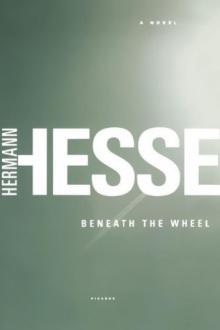 Beneath the Wheel
Beneath the Wheel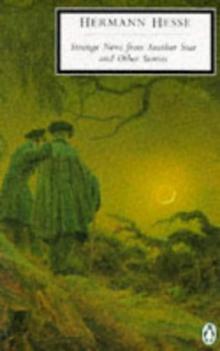 Strange News From Another Star
Strange News From Another Star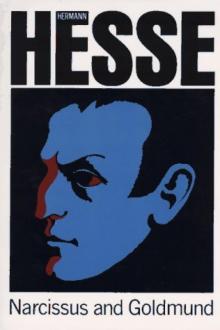 Narcissus and Goldmund
Narcissus and Goldmund Steppenwolf
Steppenwolf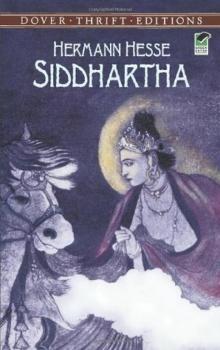 Siddhartha
Siddhartha Demian
Demian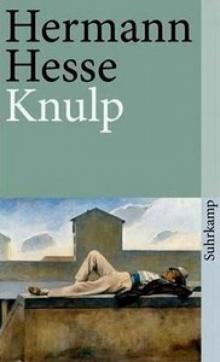 Knulp
Knulp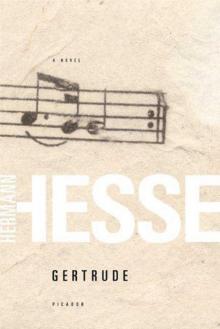 Gertrude
Gertrude Rosshalde
Rosshalde The Glass Bead Game
The Glass Bead Game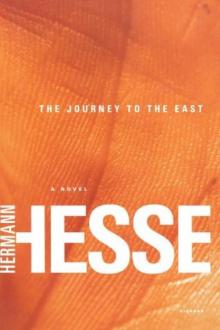 The Journey to the East
The Journey to the East Klingsor's Last Summer
Klingsor's Last Summer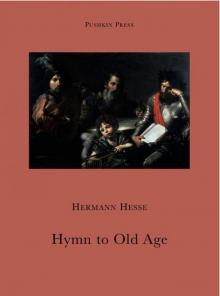 Hymn to Old Age
Hymn to Old Age Poems
Poems The Fairy Tales of Hermann Hesse
The Fairy Tales of Hermann Hesse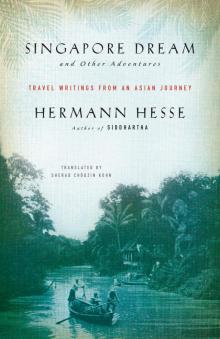 Singapore Dream and Other Adventures
Singapore Dream and Other Adventures Soul of the Age
Soul of the Age